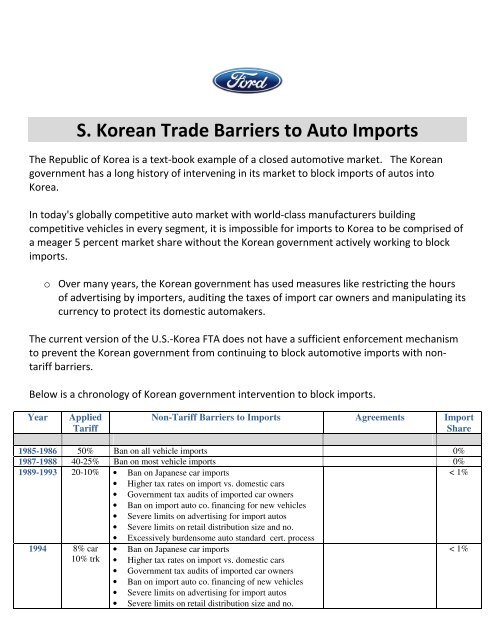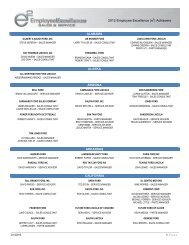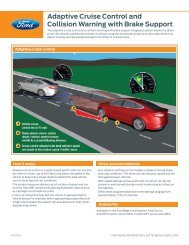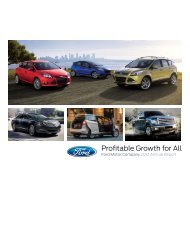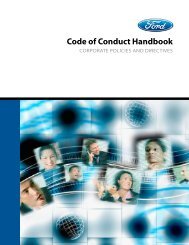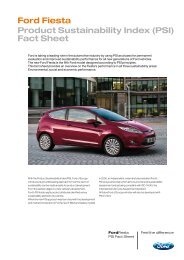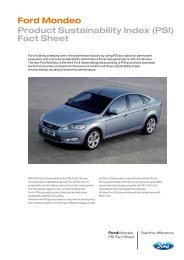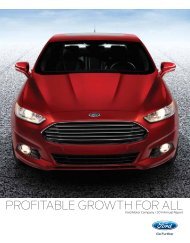S. Korean Trade Barriers to Auto Imports - Ford Motor Company
S. Korean Trade Barriers to Auto Imports - Ford Motor Company
S. Korean Trade Barriers to Auto Imports - Ford Motor Company
Create successful ePaper yourself
Turn your PDF publications into a flip-book with our unique Google optimized e-Paper software.
S. <strong>Korean</strong> <strong>Trade</strong> <strong>Barriers</strong> <strong>to</strong> Au<strong>to</strong> <strong>Imports</strong><br />
The Republic of Korea is a text-book example of a closed au<strong>to</strong>motive market. The <strong>Korean</strong><br />
government has a long his<strong>to</strong>ry of intervening in its market <strong>to</strong> block imports of au<strong>to</strong>s in<strong>to</strong><br />
Korea.<br />
In <strong>to</strong>day's globally competitive au<strong>to</strong> market with world-class manufacturers building<br />
competitive vehicles in every segment, it is impossible for imports <strong>to</strong> Korea <strong>to</strong> be comprised of<br />
a meager 5 percent market share without the <strong>Korean</strong> government actively working <strong>to</strong> block<br />
imports.<br />
o Over many years, the <strong>Korean</strong> government has used measures like restricting the hours<br />
of advertising by importers, auditing the taxes of import car owners and manipulating its<br />
currency <strong>to</strong> protect its domestic au<strong>to</strong>makers.<br />
The current version of the U.S.-Korea FTA does not have a sufficient enforcement mechanism<br />
<strong>to</strong> prevent the <strong>Korean</strong> government from continuing <strong>to</strong> block au<strong>to</strong>motive imports with nontariff<br />
barriers.<br />
Below is a chronology of <strong>Korean</strong> government intervention <strong>to</strong> block imports.<br />
Year Applied<br />
Tariff<br />
Non-Tariff <strong>Barriers</strong> <strong>to</strong> <strong>Imports</strong> Agreements<br />
Import<br />
Share<br />
1985-1986 50% Ban on all vehicle imports 0%<br />
1987-1988 40-25% Ban on most vehicle imports 0%<br />
1989-1993 20-10% • Ban on Japanese car imports<br />
< 1%<br />
• Higher tax rates on import vs. domestic cars<br />
• Government tax audits of imported car owners<br />
• Ban on import au<strong>to</strong> co. financing for new vehicles<br />
• Severe limits on advertising for import au<strong>to</strong>s<br />
• Severe limits on retail distribution size and no.<br />
• Excessively burdensome au<strong>to</strong> standard cert. process<br />
1994 8% car • Ban on Japanese car imports<br />
< 1%<br />
10% trk • Higher tax rates on import vs. domestic cars<br />
• Government tax audits of imported car owners<br />
• Ban on import au<strong>to</strong> co. financing of new vehicles<br />
• Severe limits on advertising for import au<strong>to</strong>s<br />
• Severe limits on retail distribution size and no.
• Excessively burdensome au<strong>to</strong> standard cert. process<br />
1995 8% car • Ban on Japanese car imports<br />
The “US-Korea Au<strong>to</strong>motive < 1%<br />
10% trk • Threat of gov’t tax audits of imported car owners MOU <strong>to</strong> Increase Market<br />
•<br />
•<br />
Excessively burdensome au<strong>to</strong> standard cert. process<br />
Private sec<strong>to</strong>r “anti-import” au<strong>to</strong> initiative<br />
Discrimina<strong>to</strong>ry treatment of import au<strong>to</strong>makers at<br />
national au<strong>to</strong> shows<br />
Access for Foreign<br />
Passenger Vehicles in the<br />
Republic of Korea” (’95<br />
Au<strong>to</strong> MOU)<br />
• Private sec<strong>to</strong>r “anti-import” au<strong>to</strong> initiatives<br />
1995 Au<strong>to</strong> MOU Signed (Sept 2005)<br />
1996 8% car • Ban on Japanese car imports<br />
‘95 Au<strong>to</strong> MOU < 1%<br />
10% trk • Threat of gov’t tax audits of imported car owners<br />
• SUVs, passenger cars and minivans reclassified as<br />
cars at a higher tax level<br />
• Discrimina<strong>to</strong>ry treatment of import au<strong>to</strong>makers at<br />
national au<strong>to</strong> shows<br />
• Private sec<strong>to</strong>r “anti-import” au<strong>to</strong> initiatives<br />
• Six new au<strong>to</strong> standards , with most having a<br />
disproportionately adverse impact on au<strong>to</strong> imports<br />
1997 8% car • Ban on Japanese car imports<br />
’95 Au<strong>to</strong> MOU<br />
< 1%<br />
10% trk • Threat of gov’t tax audits of imported car owners<br />
• SUVs, passenger cars and minivans reclassified as<br />
cars at a higher tax level<br />
• Discrimina<strong>to</strong>ry treatment of import au<strong>to</strong>makers at<br />
National au<strong>to</strong> shows<br />
• Government and private sec<strong>to</strong>r “anti-import” au<strong>to</strong><br />
initiatives, including local gov’t parking restrictions<br />
and higher taxes for imports, and police harassment<br />
1998 8% car • Ban on Japanese car imports<br />
• The USA-Republic of < 1%<br />
10% trk • Threat of gov’t tax audits of imported car owners Korea MOU Regarding<br />
• Discrimina<strong>to</strong>ry treatment of import au<strong>to</strong>makers at Foreign Mo<strong>to</strong>r Vehicles<br />
national au<strong>to</strong> shows<br />
in the Republic of<br />
• Private sec<strong>to</strong>r “anti-import” au<strong>to</strong> initiatives<br />
Korea” (’98 Au<strong>to</strong> MOU)<br />
• ’95 Au<strong>to</strong> MOU<br />
1998 Au<strong>to</strong> MOU Signed (Nov. 2008) •<br />
1999 8% car • Threat of gov’t tax audits of imported car owners • ’95 Au<strong>to</strong> MOU<br />
< 1%<br />
10% trk • Discrimina<strong>to</strong>ry treatment of import au<strong>to</strong>makers at • ’98 Au<strong>to</strong> MOU<br />
Bound in<br />
WTO •<br />
national au<strong>to</strong> shows<br />
Private sec<strong>to</strong>r “anti-import” au<strong>to</strong> initiatives<br />
• Three new and unique au<strong>to</strong> safety standards<br />
introduced: Front <strong>to</strong>w hook, headlamp, and remote<br />
keyless entry<br />
2000-2002 8% car • Threat of gov’t tax audits of imported car owners • ’95 Au<strong>to</strong> MOU<br />
’00-0.4%<br />
10% trk • Discrimina<strong>to</strong>ry treatment of import au<strong>to</strong>makers at • ’98 Au<strong>to</strong> MOU<br />
’01-0.5%<br />
Bound in national au<strong>to</strong> shows<br />
’02-1.0%<br />
WTO • Private sec<strong>to</strong>r “anti-import” au<strong>to</strong> initiatives<br />
• Seven new au<strong>to</strong> safety and emissions regulations,<br />
including: Pass-by noise, fuel efficiency, bumper,<br />
tinted rear-window, side impact, power-window antipinch,<br />
and various emissions standard changes<br />
2003-2006 8% car • Discrimina<strong>to</strong>ry treatment of import au<strong>to</strong>makers at • ’95 Au<strong>to</strong> MOU<br />
’03-1.5%<br />
10% trk national au<strong>to</strong> shows<br />
• ’98 Au<strong>to</strong> MOU<br />
’04-2.1%<br />
Bound in • Private sec<strong>to</strong>r “anti-import” au<strong>to</strong> initiatives<br />
’05-2.7%<br />
WTO • Seven new au<strong>to</strong> safety and emissions regulations,<br />
including: various emission standard changes, license<br />
’06-3.5%
2007 8% car<br />
10% trk<br />
Bound in<br />
WTO<br />
2008 8% car<br />
10% trk<br />
Bound in<br />
WTO<br />
2009 8% car<br />
10% trk<br />
Bound in<br />
WTO<br />
plate size, average fuel economy, OBDII, K-ULEV,<br />
au<strong>to</strong> recycling and self-certification defect<br />
investigation changes<br />
US-Korea FTA-Signed (June, 2007) and Pending<br />
Congressional Approval<br />
• <strong>Korean</strong> Fair <strong>Trade</strong> Commission raids the offices of<br />
the assoc. that represents the au<strong>to</strong> importers -<br />
KAIDA.<br />
• Private sec<strong>to</strong>r/press “anti-import” au<strong>to</strong> initiatives<br />
• <strong>Korean</strong> gov’t intervened in the currency market <strong>to</strong><br />
maintain a weaker won-raising the price of imports<br />
and subsidizing exports<br />
• Private sec<strong>to</strong>r/press “anti-import” au<strong>to</strong> initiatives<br />
• Au<strong>to</strong> insurance reform- raising insurance prices on<br />
imports more than on domestic makes<br />
• Certification change- Importers no longer allowed <strong>to</strong><br />
certify by witness tests at the import test facilities-<br />
reversed after USG objected<br />
• <strong>Korean</strong> gov’t intervened in the currency market <strong>to</strong><br />
maintain a weaker won-raising the price of imports<br />
and subsidizing exports<br />
• Private sec<strong>to</strong>r/press “anti-import” au<strong>to</strong> initiatives<br />
• New fuel economy regulation <strong>to</strong> include imports for<br />
the first time <strong>to</strong> start Jan 1, 2010<br />
• New Korea unique CO2 regulation proposed for ‘12<br />
• The US-Korea FTA<br />
signed & pending<br />
approval (KORUS FTA)<br />
• ’95 Au<strong>to</strong> MOU<br />
• ’98 Au<strong>to</strong> MOU<br />
• KORUS FTA-pending<br />
approval<br />
• ’95 Au<strong>to</strong> MOU<br />
• ’98 Au<strong>to</strong> MOU<br />
• KORUS FTA-pending<br />
approval<br />
• ’95 Au<strong>to</strong> MOU<br />
• ’98 Au<strong>to</strong> MOU<br />
4.4%<br />
5.3%<br />
4.4%


